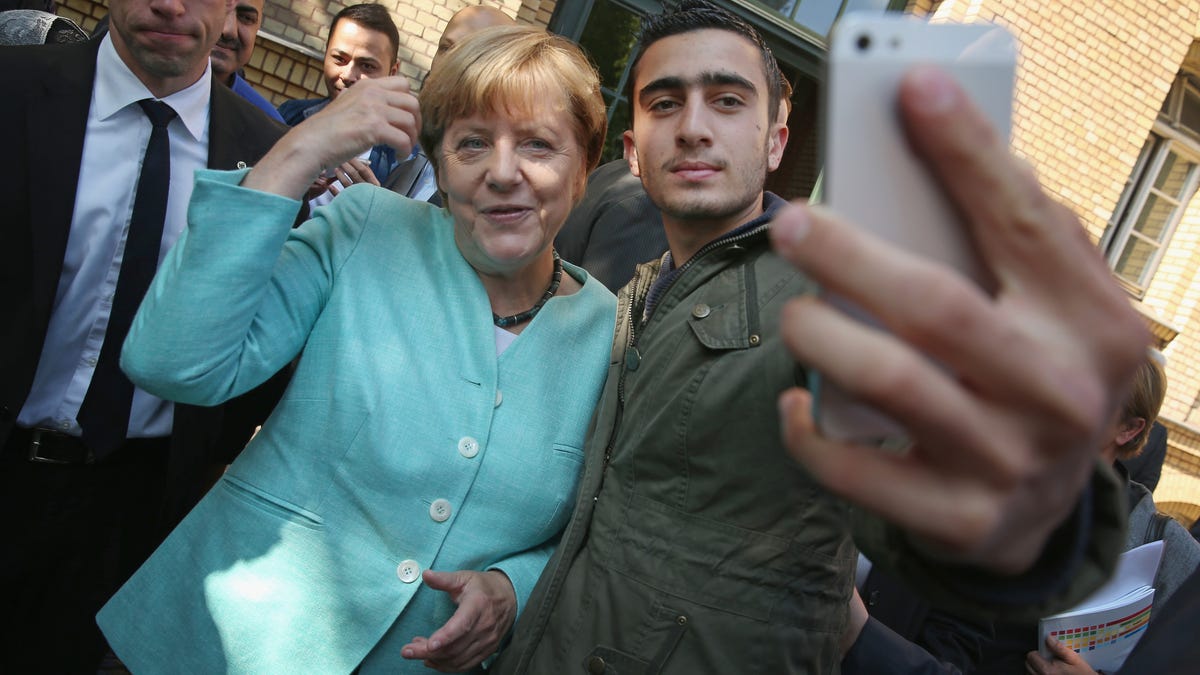Syrian refugee sues Facebook to stop fake news
Anas Modamani's photo with German Chancellor Angela Merkel has been used in posts about terrorism. He wants it to stop.

German Chancellor Angela Merkel poses in Berlin for a selfie with Anas Modamani, a refugee from Syria.
A selfie with German Chancellor Angela Merkel has reportedly turned from a moment of pride into a nightmare for Syrian refugee Anas Modamani.
The shot from September 2015 in Berlin went viral, appearing in newspapers and other media outlets. But the photo was also being used in fake news posts about terrorism, including some about the attacks in Brussels and in Berlin.
"I saw my picture posted [on a story about the Brussels airport bombing] ... But of course, this was not me!" Modamani told CNN Money. "I thought immediately: What does this mean? What about my future? This is really no joke now. This is serious."
Now, Modamani has sued Facebook in Germany over those fake news posts. According to CNN Money, he's "seeking an injunction in a German court that would require Facebook to stop the selfie from being used in fake news posts. He is also asking for all existing fake news posts using the image to be deleted."
The case was heard Monday and a ruling is expected on March 3, according to The New York Times.
Modamani didn't respond to a request for comment.
Facebook said it's committed to following German law in relation to content shared on its site.
"We have already quickly disabled access to content that has been accurately reported to us by Mr. Modamani's legal representatives, so we do not believe that legal action here is necessary or that it is the most effective way to resolve the situation," said a spokesman in an emailed statement. "We will continue to respond to Mr. Modamani's legal representatives in relation to any other content of concern to them."
Made-up stories that appear to be legitimate have been a problem for the world's largest social network for at least a year, but they've gained even more attention since the 2016 US presidential election. Facebook has been criticized for letting deliberately false articles go unchecked during the election. The company has also faced questions regarding censorship, and what should or shouldn't be allowed on the site.
Days after the election, CEO Mark Zuckerberg called it "crazy" to think Facebook's News Feed affected the results. But since then, the company has been taking steps to help its users separate the real from fabricated.
Germany, in particular, has started to scrutinize Facebook more. The country will hold general elections in September and there have been growing worries over fake news like the US has seen. Germany is considering penalizing social networks if they don't respond to complaints of hate speech and fake news within 24 hours.
Meanwhile, Germany has mixed feelings about refugees. Millions of refugees and migrants fled to Europe from the Middle East and Africa over the past couple of years, creating a humanitarian crisis that's spread throughout the European Union. Hundreds of thousands of them remain stuck in squalid refugee camps in Greece, France and Serbia, blocked from traveling farther by bureaucracy and closed borders. In 2015 alone, nearly 1.1 million people registered for asylum in Germany.
Germany initially was welcoming to refugees, helping them find jobs and adjust to life in their new country. But no European country has received as many requests for asylum as Germany, according to the UN. That fact -- combined with news of violent crimes, like the wave of sexual assaults in Cologne on New Year's Eve 2015 and the attack on a holiday market in Berlin in December -- has sparked a backlash against Merkel's "open door" policy.
First published Feb. 6, 11:30 a.m. PT.
Update, Feb. 7 at 9:36 a.m. PT: Adds comment from Facebook.
Life, disrupted: In Europe, millions of refugees are still searching for a safe place to settle. Tech should be part of the solution. But is it? CNET investigates.
Does the Mac still matter?Apple execs tell why the MacBook Pro was over four years in the making, and why we should care.

